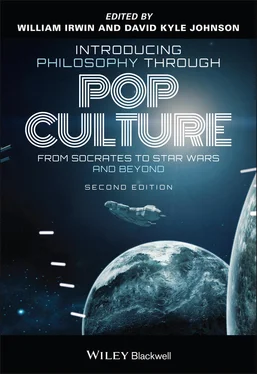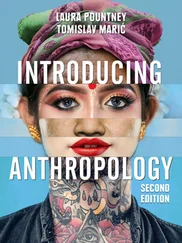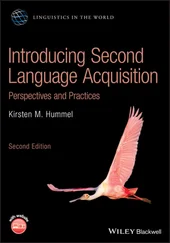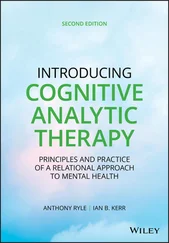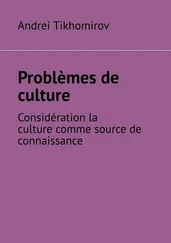Faith that Earth awaits at the end of the Colonial fleet's journey mirrors James's other momentous and forced choices. When comfortable life was possible on the Twelve Colonies, the question of Earth's existence was an abstract issue with little consequence stemming from belief or unbelief. The issue was neither momentous nor forced. But once the Colonies were destroyed, the issue became momentous: either there's a home where the survivors will be welcomed as brothers and sisters, or they're homeless and alone. The choice also becomes forced. Agnosticism concerning Earth is no longer a practical option. They can embrace the search for Earth or reject the hope of Earth by settling on the first safely habitable planet they encounter, but to do neither is ridiculous.
The importance of this issue is seen when the Colonials elect Baltar to the presidency based on his promise to settle on New Caprica and cease the search for Earth (“Lay Down Your Burdens, Part 2”). By abandoning the search, the Colonials cut themselves off from hope for a better life than what they can make for themselves on this less‐than‐inviting world. Yet, either choice is better than no choice. Most of the Colonials don't have access to compelling evidence that Earth exists. It's reasonable for them to believe that rebuilding civilization on New Caprica is their only hope for a permanent home. By settling on New Caprica, they have the opportunity for some benefits: breathing fresh air and growing food instead of living in tin boxes and eating rations. Clifford's advice would allow them neither option. There isn't enough evidence to support the belief in and search for Earth, but there's also insufficient evidence that settling on New Caprica is the wisest option. If they continually wander without settling on a planet, and cease pursuing Earth, they cut themselves off from the benefits of both.
Even apart from any potential benefits of a successful search for Earth, there are benefits gained simply from possessing an overarching life‐quest. Adama's lie isn't motivated by a desire to find Earth, but by a more subtle rationale. He understands that humans need purpose, especially in difficult circumstances. Without purpose, we wither, give up hope, and die. He lies because he wants the survivors to hope and avoid despair in the hardest of times.
Some philosophers advocate skepticism since virtually every belief can be questioned based on an argument for the conflicting view. But James shows us that a truly skeptical approach to life can be detrimental since it requires rejecting potentially rewarding opportunities. And a truly skeptical life is perhaps impossible since so many decisions are unavoidably forced. Whether to embrace life and meaning amidst uncertainty is a forced and momentous decision. Blind leaps of faith are dangerous and cynical skepticism concerning everything is unrewarding. The confidence of certainty evades many of us, but choices must be made. Avoiding the central choices of life in an attempt to risk nothing, hope for nothing, love nothing, and believe in nothing beyond the indubitable is both impractical and impossible. So say we all. 12
For pop culture resources and philosophical resources related to this chapter please visit the website for this book: https://introducingphilosophythroughpopculture.com.
1 1Burnyeat, M. (1990). The Theaetetus of Plato , 202c (trans. M.J. Levett). Indianapolis: Hackett .
2 2Gettier, E. (1963). Is justified true belief knowledge? Analysis 23: 121–123.
3 3See Goldman, A. (1976). What is justified belief? In: Justification and Knowledge (ed. G.S. Pappas ), 1–23. Dordrecht: D. Reidel.
4 4See Goldman, A. (1976). Discrimination and perceptual knowledge. Journal of Philosophy 73: 771–779.
5 5Hume, D. (1998). Of miracles. In: Dialogues Concerning Natural Religion (ed. R.H. Popkin ), 110. Indianapolis: Hackett .
6 6Plantinga, A. (2000). Warranted Christian Belief , 147. New York: Oxford University Press .
7 7Clifford, W.K. (2003). The ethics of belief. In: The Theory of Knowledge (ed. Louis P. Pojman ), 516–17. Belmont, CA: Wadsworth/Thompson.
8 8Clifford, 518.
9 9James, W. (2003). The will to believe. In: The Theory of Knowledge (ed. L.P. Pojman ), 524. Belmont, CA: Wadsworth/Thompson.
10 10James, 524.
11 11James, 520.
12 12Thanks to Jason Eberl, John Greco, and Rob Arp for their comments on earlier versions of this chapter.
7 Wakandan Resources: The Epistemological Reality of Black Panther 's Fiction
Ruby Komic
Black Panther challenges racist stereotypes of Black people and culture, suggesting that the absence of a Wakanda‐like nation in the real world is due to Western interference rather than some inherent problem in Black societies. For Black audiences, Black Panther offers a film to identify with and feel a sense of ownership and pride in, especially because the film helps remedy the inequality in fictional representations of the Black experience. Whether the viewer is Black or is not, Black Panther provides the viewer with epistemic resources , conceptual tools to understand and communicate about Black, and particularly African American, culture and experience.
Members of marginalized communities experience a lack of representation of their unique life experience in popular fictional media – and if they do see themselves represented, it is often as a stereotype, caricature, or minor character. Black Panther broke this mold by offering abundant, nuanced, and non‐stereotypical representation of Black experience. Yet, while some lauded Black Panther for its portrayal of Black culture, some also criticized the film's depiction.
For example, actor Anthony Mackie saw Black Panther 's nearly all‐Black cast and production crew as being a form of racism. As Mackie stated, in a co‐interview with actor Daveed Diggs:
I've done several Marvel movies where every producer, every director, every stunt person, every costume designer, every PA, every single person has been white. But then when you do Black Panther, you have a Black director, Black producer, you have a Black costume designer, you have a Black stunt choreographer. And I'm like, that's more racist than anything else. Because if you only can hire Black people for the Black movie, are you saying they're not good enough when you have a mostly white cast? 1
Certainly, with Black Panther being released in 2018, two years after the election of Donald Trump, in the midst of the Black Lives Matter movement (which, at the time, hadn't experienced the aftermath that resulted from the killing of George Floyd), and to a media climate sorely lacking representation from people of color, the issue of racism is virtually inescapable, presenting a sort of paradox. On one hand, Black Panther is celebrated for its presentation of Black culture and for its use of Black professionals on screen and behind the camera. On the other hand, it is criticized for these very same things.
Of course, Black Panther is fiction. There is no Wakanda or vibranium, and Shuri's lab (with all its futuristic gadgets) doesn't exist. Yet, we feel emotional about Black Panther , don't we? Indeed, how many of us have crossed our arms and said “Wakanda Forever!”? And, with a film like Black Panther (that, at times, seems to directly reflect, if not respond to, its contemporary moment) it is difficult to separate or distinguish between the characters and issues of the film and the people and issues of the real world. For Black audiences, Black Panther offered a film they could identify with and feel a sense of ownership and pride in, especially if we view the film as a resource that helps remedy the inequality in fictional representations of the Black experience. Similarly, Black Panther also offers a way of interpreting the real world through its fictional representations of Black people and Black society.
Читать дальше
